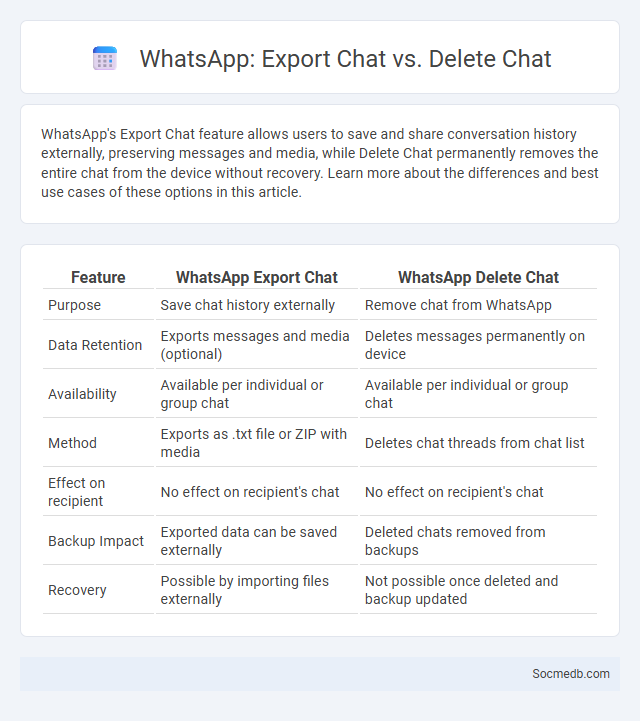
Photo illustration: WhatsApp Export Chat vs Delete Chat
WhatsApp's Export Chat feature allows users to save and share conversation history externally, preserving messages and media, while Delete Chat permanently removes the entire chat from the device without recovery. Learn more about the differences and best use cases of these options in this article.
Table of Comparison
| Feature | WhatsApp Export Chat | WhatsApp Delete Chat |
|---|---|---|
| Purpose | Save chat history externally | Remove chat from WhatsApp |
| Data Retention | Exports messages and media (optional) | Deletes messages permanently on device |
| Availability | Available per individual or group chat | Available per individual or group chat |
| Method | Exports as .txt file or ZIP with media | Deletes chat threads from chat list |
| Effect on recipient | No effect on recipient's chat | No effect on recipient's chat |
| Backup Impact | Exported data can be saved externally | Deleted chats removed from backups |
| Recovery | Possible by importing files externally | Not possible once deleted and backup updated |
Understanding WhatsApp Chat Management Options
WhatsApp chat management options enable you to organize conversations efficiently through features such as archiving, muting, and deleting chats. Utilizing starred messages and chat search functions improves quick access to important information. Your ability to customize notifications and backup settings ensures seamless communication and data security.
What Is Export Chat in WhatsApp?
Export Chat in WhatsApp allows you to create a backup of your conversation history by saving messages and media outside the app, enabling easy sharing or storage. You can export individual chats including text, images, videos, and voice messages in formats like .txt or .zip, ensuring your important data is accessible even if you switch devices. Using Export Chat helps you preserve your communication records securely and share your chat history with others when needed.
Benefits and Limitations of Exporting Chats
Exporting chats on social media platforms enhances data portability by allowing users to save, backup, and share their conversations across different devices, ensuring communication continuity and easy retrieval of important information. However, limitations include potential privacy risks, as exported chats may expose sensitive data if improperly stored or shared, and compatibility issues, where exported files may not be universally supported or easily imported back into the app. Efficient chat exporting supports legal compliance and personal record-keeping but requires cautious handling to mitigate security vulnerabilities and maintain data integrity.
When Should You Use Delete Chat in WhatsApp?
Using the Delete Chat feature in WhatsApp is essential when you want to clear conversation history to protect your privacy or free up storage space on your device. You should consider deleting chats if they contain sensitive information, outdated messages, or large media files that slow down your phone. Managing your WhatsApp chats regularly ensures your data remains secure and your app runs efficiently.
Consequences of Deleting WhatsApp Chats
Deleting WhatsApp chats can lead to the irreversible loss of important personal and professional information, affecting communication history and critical data retrieval. Backup solutions like Google Drive or iCloud must be configured properly to avoid permanent data loss. Users might also experience disruption in ongoing conversations or miss vital messages crucial for decision-making.
WhatsApp Storage Management: An Overview
WhatsApp storage management is essential for optimizing device performance by controlling media files, chat backups, and application data. Users can access the storage usage section within WhatsApp settings to review space occupied by individual chats and bulk-delete unnecessary images, videos, and voice messages. Efficient management of WhatsApp storage helps prevent app crashes, improves speed, and frees up valuable phone memory for other applications.
How Export, Delete, and Storage Management Differ
Social media platforms vary in how they handle export, delete, and storage management features, directly impacting user data control. Export functions enable users to download their content, with formats and data scope differing significantly among platforms like Facebook and Instagram. Delete options usually allow permanent removal of content or accounts, while storage management tools help users monitor and free up space, each offering distinct interfaces and policies that affect privacy and data retention.
Step-by-Step Guide: Exporting, Deleting, and Managing Storage
To efficiently manage your social media storage, start by exporting your data through the platform's settings, ensuring you have copies of photos, videos, and messages. Next, delete unnecessary posts, old media files, and unused apps to free up space and optimize performance. Regularly review storage usage and adjust your content strategy to maintain a clean and organized social media presence tailored to your needs.
Best Practices for Efficient WhatsApp Data Management
Efficient WhatsApp data management requires organizing chat backups regularly to prevent storage overload and ensure quick data retrieval. You should clear unnecessary media files and archive important conversations to maintain optimal app performance. Utilizing cloud storage solutions for backups also safeguards your data against loss while freeing up your device's internal memory.
Choosing the Right Option: Export, Delete, or Manage Storage?
Choosing the right social media management option depends on your storage needs and data priorities. Exporting allows you to back up valuable content, ensuring important photos, videos, or messages are safely preserved outside the platform. Deleting frees up space and enhances privacy by permanently removing unwanted data, while managing storage offers control over cached files and app data to optimize device performance.
 socmedb.com
socmedb.com